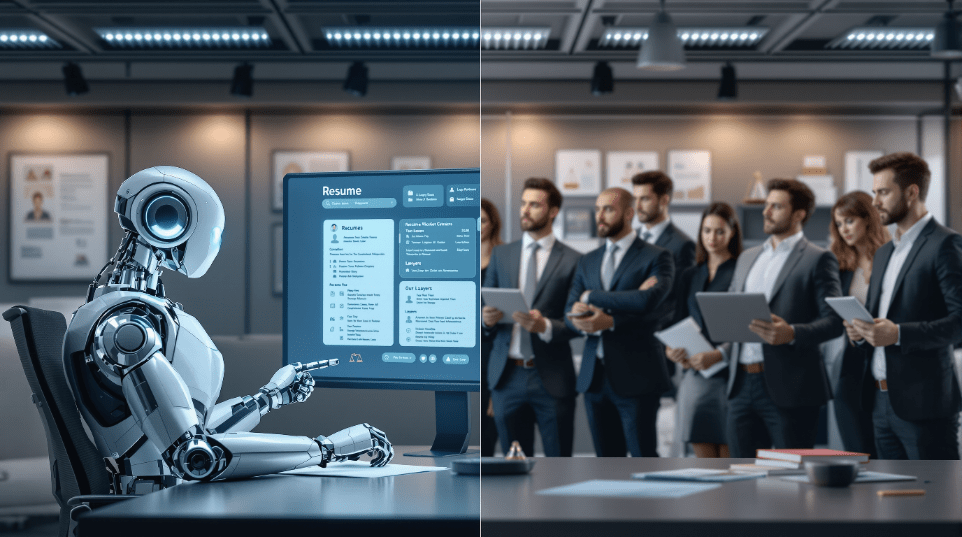AI Job Disruption: Why Recruiters and Lawyers Should Be Concerned
Hey there, have you ever paused to think about how quickly technology is changing the world of work? As someone who’s passionate about career trends, I can’t help but notice the buzz around AI job disruption—it’s not just a futuristic concept anymore; it’s happening right now, affecting millions. In fact, by 2025, AI job disruption could impact nearly 300 million jobs globally, with white-collar fields like recruitment and law feeling the shake-up first. Let’s unpack this together and explore why these professionals need to pay attention, while keeping things real and relatable.
The Growing Impact of AI Job Disruption on the Workforce
AI job disruption is reshaping industries faster than we might realize, blending innovation with a touch of uncertainty. According to recent reports, AI-driven automation is set to transform or eliminate roles across sectors, with estimates suggesting up to 300 million jobs could be affected by 2025. Honestly, this blew my mind when I first read it—it’s not just blue-collar jobs on the line; white-collar positions in recruitment and law are prime targets for AI job disruption.
Think about it: machines are getting smarter at handling repetitive tasks, which means human jobs that rely on routine are evolving or vanishing. But here’s the silver lining—while AI job disruption sounds intimidating, it’s also opening doors for those who adapt. Have you ever wondered how your own job might change? Let’s dive deeper into specific areas like recruitment, where the shifts are already underway.
How AI Job Disruption is Reshaping Recruitment
Recruitment has always been about that human touch—building connections and making gut-feeling decisions. Yet, AI job disruption is flipping the script with tools that handle the grunt work in seconds. For instance, AI algorithms can sift through thousands of resumes, rank candidates based on keywords, and even simulate interviews, cutting down on the need for entry-level recruiters.
Key developments include automated resume screening, where AI quickly filters applicants using predefined criteria, and AI-powered interviews that analyze tone and behavior without a human in the room. I remember chatting with a recruiter friend who said this feels like a “quiet erosion” of their role—efficient, sure, but it raises questions about job security. Predictive analytics is another game-changer, helping predict candidate success and reducing HR workloads, which is great for businesses but tough on the workforce.
While these advancements boost productivity, they highlight the broader AI job disruption in recruitment. If you’re in this field, have you started exploring how to integrate these tools rather than compete with them? Tools like these are already in use at major companies, and according to experts, they could lead to fewer opportunities for mid-level roles.
Real-World Examples of AI Job Disruption in Action
Let me paint a picture: Imagine a hiring manager using an AI system to handle initial screenings—it’s faster and less biased, but it might mean fewer jobs for traditional recruiters. This is AI job disruption at its core, and it’s not just hypothetical; companies are adopting it en masse. One study I came across showed that AI can process applications 10 times faster than humans, which is impressive but also a wake-up call.
To make this more visual, check out this image below—it illustrates how AI is stepping into roles once reserved for people. Does this resonate with your experiences in the job market? I’d love to hear your thoughts in the comments!

Why AI Job Disruption Poses a Major Threat to Legal Professionals
Shifting gears to the legal world, which many thought was immune to tech takeovers, AI job disruption is making waves here too. Lawyers and their teams have long relied on meticulous research and document reviews, but AI is stepping in to handle these tasks with incredible speed and accuracy. For example, advanced AI tools can comb through case law and contracts, spotting inconsistencies faster than a junior associate ever could.
Specific threats include AI-driven research that analyzes legal documents in minutes, contract analysis platforms that automate risk assessments, and predictive models that forecast case outcomes based on past data. While seasoned lawyers will always be needed for the nuanced, high-stakes stuff, roles like paralegals and legal assistants are particularly vulnerable to AI job disruption. The U.S. Bureau of Labor Statistics even projects a decline in these positions over the next decade due to automation—it’s a stark reminder that no field is entirely safe.
Have you ever faced a situation where technology made your job feel obsolete?
The Broader Implications of AI Job Disruption: Is a White-Collar Recession on the Horizon?
Beyond recruitment and law, AI job disruption is fueling what some call a white-collar recession, where professional roles in tech, finance, and beyond are shrinking. This isn’t your typical economic downturn; it’s driven by AI’s push for efficiency, leading companies to prioritize machines over hiring more staff. Positions like junior analysts or content strategists are disappearing, creating ripple effects on career paths.
Experts warn that this AI job disruption could mean fewer entry-level opportunities, pushing workers to rethink their skills. According to a Forbes article, corporations are already seeing the benefits of AI-driven efficiency, but at what cost to the human workforce? For a deeper dive into this trend, I recommend checking out this external resource from Sandtech on the future of work—it’s a eye-opening read that aligns with what we’re discussing here.
Preparing for the AI Job Disruption Era
Alright, let’s get practical—despite the challenges of AI job disruption, there’s plenty you can do to future-proof your career. Start with upskilling: Learning about AI tools and analytics can turn you from a potential victim into a savvy user. For recruiters and lawyers, emphasizing your human strengths like creativity and empathy is key—these are areas where AI still falls short.
- Upskilling Tip 1: Dive into online courses on AI platforms to stay ahead.
- Tip 2: Redefine your role by focusing on strategic advice, using AI as a helper rather than a replacement.
- Final Tip: Commit to continuous learning—it’s not just about surviving AI job disruption; it’s about thriving.
Here’s my take: I once worried about how AI might affect my own writing gig, but embracing it opened new doors. What steps are you taking? Share in the comments below!
Conclusion: A Call to Action in the Age of AI Job Disruption
In wrapping this up, AI job disruption is undeniably transforming recruitment, law, and the broader workforce, but it’s not all doom and gloom. By adapting, upskilling, and leaning into what makes us human, we can navigate these changes with confidence. Remember, this is an opportunity to innovate and grow—don’t resist it; embrace it.
I’d love to hear your story: Have you experienced AI job disruption firsthand, or do you have tips to share? Drop a comment below, check out our related articles, and let’s keep the conversation going. Thanks for reading—stay curious!
References
- [1] World Economic Forum. (2020). “The Future of Jobs Report 2020.” Retrieved from WEF Report.
- [3] U.S. Bureau of Labor Statistics. (2022). “Occupational Outlook Handbook: Lawyers and Judicial Workers.” Retrieved from BLS Handbook.
- [4] McKinsey Global Institute. (2023). “The Economic Potential of Generative AI.” Retrieved from McKinsey Report.
- [5] Harvard Business Review. (2021). “How to Future-Proof Your Career in the Age of AI.” Retrieved from HBR Article.
- [8] Gartner. (2023). “AI in HR: Trends and Predictions.” Retrieved from Gartner Insights.
